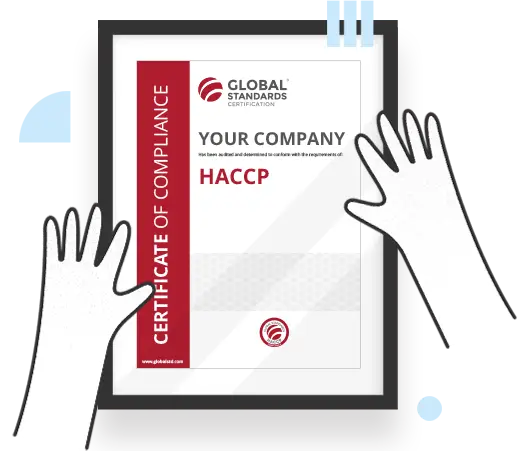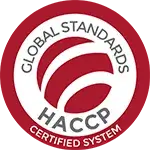

COMPLIANCE CERTIFICATION
HACCP
This system reduces, controls, or eliminates the hazards than can compromise food safety.
HACCP (Hazard Analysis and Critical Control Points) is a system that approaches food safety through the identification, analysis, and control of the physical, chemical, biological, and radiological hazards, including raw materials, the stages of the elaboration, the distribution and the consumption of the finished product.
It has been designed to be implemented in all branches of food industry, such as: farming, harvesting, transformation or elaboration, and distribution of consumables. The pre-requirements programs, such as Good Manufacture Practices (GMP), are the foundations of the successful development and implementation of the HACCP systems. The Food-Safety system based on the HACCP principles, has been successfully implemented in food processors, retail stores, and operations linked to food services, as well as in the pharmaceutical industry.
HACCP SYSTEM PRINCIPLES
These are some recommendations and basic requirements you shall fulfill to request a HACCP audit, principles and guidelines of implementation, adopted by the Codex Alimentarious commission:
The implementation of a HACCP system requires twelve tasks dedicated to ensuring the right application of the seven principles which are the following initial steps:
- To establish a HACCP equipment
- To describe the product
- To identify the previous usage
- To make a flow chart of processes
- To confirm the on-site flow chart
Also follow these seven principles:
- 1st principle, to identify and analyze danger
- 2nd principle, to determine critical points of control (CPC)
- 3RD principle. To establish critical limits for each CPC
- 4th principle. To establish monitoring procedures
- 5th principle. To establish corrective actions
- 6th principle. To verify HACCP plan
- 7th principle. To keep records
* Reference: NOM-251-SSA1:2009 / Codex Alimentarius
Additional Requirements
For completing the necessary requirements to obtain the HACCP system compliance certificate, it is also necessary to implement pre-requirements programs to ensure a hygiene environment during food production like Good Manufacturing Practices (GMP) which is fundamental for implementing and developing HACCP.
To obtain certification of compliance for your HACCP system, you shall ensure as a minimum:
- To keep your HACCP system documented.
- To define the certification scope.
- To keep evidence of the system implementation (we recommend at list 3 months) like the following: related registers with the documents control, registers control, corrective actions, non-conformities products administration, internal audits among others.
- To keep capable internal auditors to perform HACCP system audits.
COMPLIANCE AUDITS
Audit under Global Standards methodology

BENEFITS
To implement HACCP methodology in your company will impact food safety, customers and consumers satisfaction. These are some benefits which will be shown:
To fulfill government regulations in other countries that demands HACCP to export food products.
The consumers trust to have food safety.
International methodology to ensure food safety.
To maximize food safety and risk reduction in food production.
HOW TO BE CERTIFIED?
The certification process pays attention to every detail to make sure that the company duly complies with all of the standard’s requirements.
1
Quote and signing of the contract
2
Planning and Development of Audit
3
Closing of Non-Conformities
4
Certification Committee and Issuance of the Certificate

NEXT COURSES